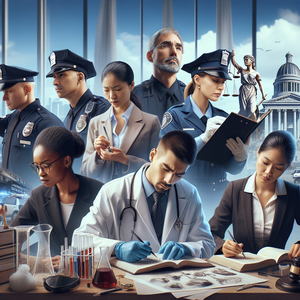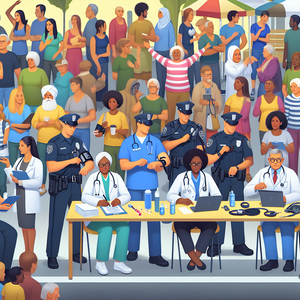
Discovering 15 Exciting Careers in Criminal Justice: Opportunities and Requirements
The realm of criminal justice is a vibrant field offering a wealth of career paths for those passionate about making a difference in society. As the landscape of crime and public safety evolves, so do the opportunities for graduates in this sector. From law enforcement to legal services and specialized areas like cybersecurity, there are numerous roles that not only align with personal interests but also significantly impact the justice system. This article explores 15 compelling career options, detailing their responsibilities, educational prerequisites, job market trends, and their essential contributions to society.
Job Summaries:
Police Officer:
- Police officers serve as the frontline of public safety and law enforcement.
- They respond to emergencies, conduct investigations, and patrol neighborhoods.
- This role requires at least a high school diploma and training at a police academy.
- Strong communication and problem-solving abilities are vital in this role.
- This role fosters community engagement.
- Job openings can often be explored through local police departments.
Forensic Scientist:
- Forensic scientists play a pivotal role in the justice system by analyzing evidence from crime scenes.
- They employ scientific techniques to examine fingerprints, DNA, and other materials.
- A bachelor's degree in forensic science or a related discipline is typically required.
- Sharp analytical skills are essential for forensic scientists.
- Their meticulous work significantly contributes to the integrity of legal proceedings.
- Opportunities abound in forensic labs and law enforcement agencies.
Paralegal:
- Paralegals assist attorneys by conducting research, drafting legal documents, and managing case files.
- Generally, an associate degree or paralegal certificate is required, coupled with excellent organizational skills.
- They are integral to streamlining legal processes and ensuring attorneys are well-prepared for cases.
- Job openings are available in law firms and corporate legal departments.
Correctional Officer:
- Correctional officers are responsible for maintaining order within prisons and jails by supervising inmates and enforcing regulations.
- The minimum requirement is a high school diploma, with additional training in corrections often beneficial.
- Interpersonal skills and conflict resolution abilities are essential, focusing on both rehabilitation and safety.
- Numerous positions are available across local, state, and federal correctional facilities.
Intelligence Analyst:
- Intelligence analysts gather and interpret data related to criminal activities.
- They provide support to law enforcement efforts.
- Candidates typically have backgrounds in criminal justice or political science.
- Strong analytical skills are crucial for developing crime-fighting strategies.
- This role is increasingly important for enhancing public safety.
- Job openings are found in government agencies and law enforcement.
FBI Agent:
- FBI agents are tasked with investigating federal offenses and enforcing federal laws.
- This prestigious position requires a bachelor's degree and extensive training at the FBI Academy, often with specialization in areas like counterterrorism or cybercrime.
- The role is vital for national security.
- Interested candidates should regularly check the FBI's career portal for openings.
Crime Scene Investigator (CSI):
- CSIs collect and analyze evidence from crime scenes.
- Documenting findings and preparing reports for court.
- A degree in criminal justice or forensic science is often necessary.
- Specialized training is often required.
- Attention to detail and analytical thinking are crucial in this role.
- Job openings can be found in law enforcement agencies and forensic laboratories.
Probation Officer:
- Probation officers supervise individuals on probation.
- Conducting interviews and ensuring compliance with probation terms.
- A bachelor's degree in criminal justice or social work is typically required.
- Strong interpersonal skills are necessary.
- This role promotes rehabilitation and helps reduce recidivism rates.
- Openings can be explored through local and state probation departments.
Criminologist:
- Criminologists analyze crime patterns and causes to inform policy and law enforcement strategies.
- Holding a master’s degree or Ph.D. in criminology or sociology is common, along with robust research skills.
- Their findings are essential for shaping effective crime prevention strategies and policies.
- Research positions are available at universities and think tanks.
Private Investigator:
- Private investigators conduct various investigations for clients.
- Strong analytical and observational skills are necessary.
- A high school diploma is typically required.
- Many pursue degrees in criminal justice.
- Licensing varies by state.
- This role is key for providing clients with accurate information in personal or legal matters.
- Opportunities can be found within private investigation firms.
Court Clerk:
- Court clerks oversee administrative functions within courts.
- Responsibilities include filing documents and scheduling hearings.
- A high school diploma may suffice for some positions.
- Many positions prefer candidates with an associate degree in legal studies.
- Strong organizational skills are crucial for ensuring efficient court operations.
- Openings are available across local, state, and federal courts.
Emergency Management Director:
- Emergency management directors create response plans for disasters.
- They work closely with law enforcement and public health officials.
- Typically, a bachelor’s degree in criminal justice or emergency management is required.
- Strong leadership skills are necessary for this role.
- This role is vital for community preparedness and crisis response.
- Job seekers are encouraged to explore openings in local and state emergency management agencies.
Cybercrime Investigator:
- Cybercrime investigators focus on online criminal activities.
- Requiring a bachelor's degree in criminal justice or computer science.
- Familiarity with cybersecurity practices is essential as technology continues to evolve.
- This role is increasingly crucial within the criminal justice system.
- Opportunities available in law enforcement agencies or private security firms.
Victim Advocate:
- Victim advocates provide support to individuals affected by crime.
- They guide individuals through the legal process.
- They connect individuals with necessary resources.
- A background in social work or criminal justice is advantageous.
- Strong communication skills are important for this role.
- This role is fundamental in ensuring victims receive the support they need during challenging times.
- Job openings are available in non-profit organizations and law enforcement.
Legal Secretary:
- Legal secretaries offer administrative support to legal teams.
- Often requiring an associate degree or certificate in legal studies.
- Organizational and typing skills are vital for maintaining efficient office operations.
- Job seekers can find opportunities in law firms, corporate legal departments, and government agencies.
By investigating these in-demand career options, graduates can uncover fulfilling and impactful roles within the criminal justice system. With a focus on current job openings and evolving trends, this field provides numerous opportunities for those eager to make a difference. Whether starting a new career or seeking to advance within the field, a wealth of options awaits in the diverse world of criminal justice.
Explore More Jobs

